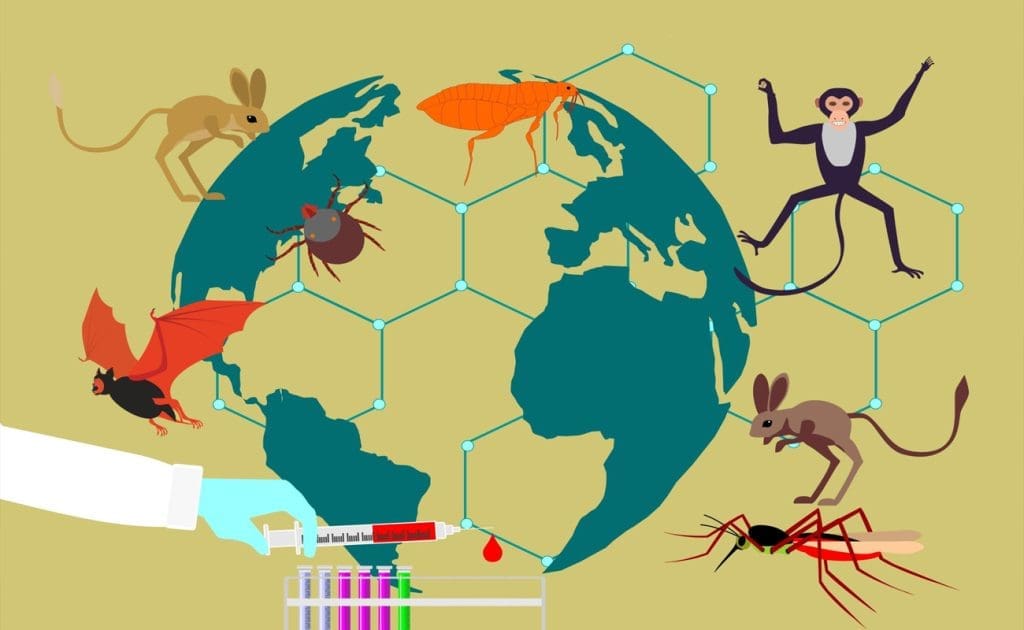
92 миллиарда
воды требуется для производства всего одного килограмма говядины — яркий пример того, как животноводство потребляет треть мировых запасов пресной воды. [1]

80%
of Amazon deforestation is caused by cattle ranching — the number one culprit behind the destruction of the world’s largest rainforest. [2]

77%
глобальных сельскохозяйственных земель используется для скота и корма для животных — и при этом обеспечивает лишь 18% калорий мира и 37% его белка. [3]

Парниковые газы
Промышленное животноводство производит больше парниковых газов, чем весь мировой транспортный сектор вместе взятый. [4]

Что мы делаем
земных животных убивают ради пищи каждый год — и 99% из них проводят жизнь на промышленных фермах. [5]

400+ видов
токсичных газов и 300+ миллионов тонн навоза производятся промышленными фермами, отравляя наш воздух и воду. [6]

1,048 млн тонн
зерна скармливаются скоту ежегодно — достаточно, чтобы многократно покончить с мировым голодом. [7]

37%
выбросов метана приходится на животноводство — парниковый газ в 80 раз более мощный, чем CO₂, ускоряющий разрушение климата. [8]

80%
антибиотиков во всем мире используются на фабриках животноводства, что способствует развитию антибиотикорезистентности. [9]

от 1 до 2,8 триллиона
Морские животные ежегодно убиваются рыболовством и аквакультурой — большинство из них даже не учитываются в статистике животноводства. [10]

60%
потеря глоб [11]

75%
земель сельскохозяйственного назначения можно было бы освободить, если бы мир перешёл на растительную диету — освободив территорию размером с Соединённые Штаты, Китай и Европейский Союз вместе взятые. [12]

Аккордеон. Открывайте ссылки клавишей Enter или пробелом, закрывайте клавишей Escape и перемещайтесь клавишами со стрелками
Лучшее, что мы можем сделать, — это изменить то, как мы едим. Растительная диета — это более сострадательный выбор как для нашей планеты, так и для разнообразных видов, с которыми мы сосуществуем.

Спасите Землю
Animal agriculture is the leading cause of biodiversity loss and species extinction globally, posing a severe threat to our ecosystems.

Положите конец их страданиям
Индустрия животноводства сильно зависит от потребительского спроса на мясо и продукты животного происхождения. Каждый растительный прием пищи способствует освобождению животных от систем жестокости и эксплуатации.

Процветайте на растениях
Растительные продукты не только вкусны, но и богаты витаминами и минералами, которые повышают энергию и способствуют общему благополучию. Принятие растительной диеты - эффективная стратегия для предотвращения хронических заболеваний и поддержания долгосрочного здоровья.
Жестокость фабричного животноводства:
Где животные страдают в молчании, Мы становимся их голосом.
15 展望ов литров
Где бы ни страдали животные или их голоса не были услышаны, мы вмешиваемся, чтобы противостоять жестокости и отстаивать сострадание. Мы неустанно работаем, чтобы раскрыть несправедливость, добиться долгосрочных изменений и защитить животных, где бы ни возникла угроза их благополучию.
Куры
Правда о наших пищевых индустриях
Правда о нашей пищевой промышленности раскрывает скрытую реальность жестокости фабричного животноводства, где миллиарды животных испытывают огромные страдания каждый год. Помимо воздействия на благополучие животных, промышленное животноводство также наносит серьезный ущерб окружающей среде, от изменения климата до утраты биоразнообразия. В то же время система способствует росту рисков для здоровья, включая ожирение, диабет и сердечно-сосудистые заболевания. Выбор растительной диеты и приверженность устойчивому образу жизни предлагает мощное решение — снижение страданий животных, защиту планеты и улучшение здоровья человека.
МЯСНАЯ ИНДУСТРИЯ
ЖИВОТНЫЕ, УБИТЫЕ РАДИ МЯСА
Животные, убитые ради мяса, начинают страдать в день своего рождения. Мясная промышленность связана с некоторыми из наиболее жестоких и бесчеловечных практик обращения.

Кризис
Рождённые в страданиях, коровы испытывают страх, изоляцию и жестокие процедуры, такие как удаление рогов и кастрация — задолго до начала забоя.

Pigs
Свиньи, более умные, чем собаки, проводят свою жизнь в тесных, лишённых окон фермах. Самки свиней страдают больше всего — неоднократно оплодотворяются и содержатся в клетках настолько маленьких, что они не могут даже повернуться, чтобы успокоить своих детёнышей.

Chickens
Куры испытывают на себе худшее от фабричного животноводства. Упакованные в грязные сараи тысячами, их разводят, чтобы они росли так быстро, что их тела не могут справиться — что приводит к болезненным деформациям и ранней смерти. Большинство из них убивают в возрасте всего шести недель.

Ягнята
Ягнята подвергаются болезненным увечьям и отрываются от своих матерей всего через несколько дней после рождения — всё ради мяса. Их страдания начинаются слишком рано и заканчиваются слишком быстро.

Коровы
Кролики страдают от жестоких убийств без какой-либо правовой защиты — многие из них избиваются, подвергаются жестокому обращению и имеют перерезанное горло, оставаясь в сознании. Их молчаливые страдания часто остаются незамеченными.

Индейки
Каждый год миллионы индеек сталкиваются с жестокой смертью, многие умирают от стресса во время транспортировки или даже варятся заживо на скотобойнях. Несмотря на их интеллект и прочные семейные связи, они страдают молча и в большом количестве.
ЗА ПРЕДЕЛАМИ ЖЕСТОКОСТИ
The meat industry harms both the planet and our health.
Воздействие мяса на окружающую среду
Разведение животных для пищи потребляет огромное количество земли, воды, энергии и наносит значительный ущерб окружающей среде. По данным ФАО ООН, сокращение потребления продуктов животного происхождения жизненно важно для борьбы с изменением климата, поскольку животноводство составляет почти 15% глобальных выбросов парниковых газов. Индустриальные фермы также тратят огромные водные ресурсы—на корм, уборку и питье—и загрязняют более 35 000 миль водных путей в США.
Риски для здоровья
Употребление продуктов животного происхождения увеличивает риск серьезных проблем со здоровьем. ВОЗ классифицирует переработанное мясо как канцероген, повышающий риск рака толстой и прямой кишки на 18%. Продукты животного происхождения богаты насыщенными жирами, связанными с сердечно-сосудистыми заболеваниями, инсультом, диабетом и раком—основными причинами смерти в США. Исследования показывают, что вегетарианцы живут дольше; одно исследование показало, что они были на 12% менее склонны к смерти в течение шести лет по сравнению с мясоедами.
МОЛОЧНАЯ ИНДУСТРИЯ
ТЁМНАЯ ТАЙНА МОЛОЧНОЙ ПРОМЫШЛЕННОСТИ
За каждым стаканом молока стоит цикл страданий — коровы-матери многократно подвергаются искусственному оплодотворению, только чтобы их телят забрали, а их молоко было собрано для людей.
Разбитые семьи
На молочных фермах матери плачут по своим телятам, когда их забирают — чтобы молоко, предназначенное для них, можно было разлить по бутылкам для нас.
В одиночном заключении
Телята, оторванные от матерей, проводят свою раннюю жизнь в холодном одиночестве. Их матери остаются привязанными в тесных стойлах, терпя годы молчаливого страдания — просто чтобы произвести молоко, никогда не предназначенное для нас.
Болезненные увечья
От жгучей боли от клеймения до острой агонии удаления рогов и купирования хвоста — эти жестокие процедуры проводятся без анестезии, оставляя коров изуродованными, напуганными и сломленными.
Жестоко убиты
Коровы, разводимые для молочного производства, сталкиваются с жестокой кончиной, будучи забиты слишком молодыми, как только они перестают производить молоко. Многие из них переживают болезненные перевозки и остаются в сознании во время забоя, их страдания скрыты за стенами отрасли.
ЗА ПРЕДЕЛАМИ ЖЕСТОКОСТИ
Жестокое молочное животноводство наносит вред окружающей среде и нашему здоровью.
Экологические издержки молочного животноводства
Молочное животноводство выделяет большое количество метана, оксида азота и углекислого газа - мощных парниковых газов, наносящих вред атмосфере. Оно также приводит к вырубке лесов путем преобразования естественных сред обитания в сельскохозяйственные угодья и загрязняет местные источники воды из-за неправильного обращения с навозом и удобрениями.
Риски для здоровья
Употребление молочных продуктов связано с более высоким риском серьезных проблем со здоровьем, включая рак груди и простаты, из-за высокого уровня инсулиноподобного фактора роста в молоке. Хотя кальций необходим для крепких костей, молочные продукты не являются единственным или лучшим источником; листовые овощи и обогащенные растительные напитки предлагают безжестокостные, более здоровые альтернативы.
ЯИЧНАЯ ИНДУСТРИЯ
ЖИЗНЬ КЛЕТЧАТОЙ КУРИЦЫ
Куры — социальные животные, которые любят искать пищу и заботиться о своих семьях, но они проводят до двух лет в тесных клетках, не имея возможности расправить крылья или вести себя естественно.
34 часа страданий: настоящая цена яйца
Уничтожение мужских цыплят
Мужские цыплята, не способные нести яйца или расти как бройлеры, считаются бесполезными яичной промышленностью. Сразу после вылупления они отделяются от самок и жестоко убиваются - либо задыхаются, либо измельчаются заживо в промышленных машинах.
Интенсивное содержание под стражей
В США почти 75% кур-несушек содержатся в тесных проволочных клетках, каждая из которых имеет меньше места, чем лист бумаги для принтера. Вынужденные стоять на жестких проводах, которые травмируют их ноги, многие куры страдают и умирают в этих клетках, иногда оставляя их гнить среди живых.
Жестокие увечья
Куры в яичной промышленности страдают от сильного стресса из-за крайней изоляции, что приводит к вредным поведениям, таким как самокалечение и каннибализм. В результате работники отрезают часть их чувствительных клювов без обезболивающих.
ЗА ПРЕДЕЛАМИ ЖЕСТОКОСТИ
Яичная промышленность наносит вред как нашему здоровью, так и окружающей среде.
Кролики
Производство яиц наносит значительный вред окружающей среде. Каждый потребленный яйцо производит полфунта парниковых газов, включая аммиак и углекислый газ. Кроме того, большое количество пестицидов, используемых в птицеводстве, загрязняет местные водоемы и воздух, способствуя повсеместному ухудшению состояния окружающей среды.
Риски для здоровья
Яйца могут содержать вредные бактерии Salmonella, даже когда они выглядят нормально, вызывая симптомы болезни, такие как диарея, лихорадка, боли в животе, головная боль, тошнота и рвота. Яйца с ферм часто поступают от кур, содержащихся в плохих условиях, и могут содержать антибиотики и гормоны, представляющие риск для здоровья. Кроме того, высокое содержание холестерина в яйцах может способствовать возникновению проблем с сердцем и сосудами у некоторых людей.
РЫБНАЯ ИНДУСТРИЯ
СМЕРТОНОСНАЯ РЫБНАЯ ИНДУСТРИЯ
Рыбы чувствуют боль и заслуживают защиты, но не имеют юридических прав в сельском хозяйстве или рыболовстве. Несмотря на их социальную природу и способность чувствовать боль, они рассматриваются как простые товары.
Рыбные фермы промышленного масштаба
Большинство потребляемой сегодня рыбы выращивается в переполненных внутренних или океанских аквафермах, где они содержатся в загрязненных водах с высоким уровнем аммиака и нитратов всю свою жизнь. Эти суровые условия приводят к частым инвазиям паразитов, которые поражают их жабры, органы и кровь, а также к широким бактериальным инфекциям.
Промышленное рыболовство
Коммерческий рыбный промысел причиняет огромные страдания животным, убивая почти триллион рыб ежегодно во всем мире. Массовые суда используют длинные лески — до 50 миль с сотнями тысяч наживленных крючков — и жаберные сети, которые могут простираться от 300 футов до семи миль. Рыбы слепо плывут в эти сети, часто задыхаясь или истекая кровью до смерти.
Жестокое Убой
Без правовой защиты рыбы страдают от ужасных смертей на бойнях США. Лишенные воды, они задыхаются беспомощно, когда их жабры разрушаются, медленно задыхаясь в агонии. Более крупные рыбы — тунец, меч-рыба — жестоко избиваются, часто раненые, но все еще в сознании, вынуждены терпеть повторные удары перед смертью. Эта неумолимая жестокость остается скрытой под поверхностью.
ЗА ПРЕДЕЛАМИ ЖЕСТОКОСТИ
Рыбная промышленность разрушает нашу планету и наносит вред нашему здоровью.
Рыболовство и окружающая среда
Промышленное рыболовство и рыбоводство наносят вред окружающей среде. Рыбоводческие заводы загрязняют воду токсичными уровнями аммиака, нитратов и паразитов, вызывая широкомасштабный ущерб. Крупные коммерческие рыболовные суда разрушают океанский дно, уничтожая среды обитания и выбрасывая до 40% своего улова в качестве прилова, ухудшая экологическое воздействие.
Риски для здоровья
Употребление рыбы и морепродуктов несет риски для здоровья. Многие виды, такие как тунец, меч-рыба, акула и скумбрия, содержат высокие уровни ртути, которые могут нанести вред развитию нервной системы плода и маленьких детей. Рыба также может быть загрязнена токсичными химическими веществами, такими как диоксины и ПХБ, связанными с раком и репродуктивными проблемами. Кроме того, исследования показывают, что потребители рыбы могут ежегодно потреблять тысячи крошечных пластиковых частиц, что может вызвать воспаление и повреждение мышц с течением времени.
200 Животных.
Вот сколько жизней один человек может спасти каждый год, перейдя на веганство.
В то же время, если зерно, используемое для кормления скота, вместо этого использовать для кормления людей, оно могло бы обеспечить продовольствием до 3,5 миллиардов человек ежегодно.
Критический шаг в решении проблемы глобального голода.



Жестокое заточение
Реальность фабричного животноводства
Около 99% выращенных животных проводят всю свою жизнь внутри огромных промышленных ферм. На этих объектах тысячи животных содержатся в проволочных клетках, металлических ящиках или других ограничительных помещениях внутри грязных, лишенных окон сараев. Им отказывают в самых основных естественных поведенческих реакциях — воспитании потомства, поисках пищи в почве, строительстве гнезд или даже ощущении солнечного света и свежего воздуха — до дня, когда их перевозят на скотобойни.
Индустрия промышленного животноводства построена на максимизации прибыли за счет животных. Несмотря на жестокость, эта система продолжает существовать, поскольку считается более прибыльной, оставляя за собой разрушительный след страданий животных, скрытый от публичного взгляда.
Животные на фабричных фермах испытывают постоянный страх и мучения:
Ограничения пространства
Животные часто бывают настолько стеснены, что не могут повернуться или лечь. Куры живут в крошечных клетках, цыплята и свиньи — в переполненных сараях, а коровы — в грязных загонах.
Применение антибиотиков
Антибиотики ускоряют рост и сохраняют жизнь животных в антисанитарных условиях, что может способствовать появлению антибиотикорезистентных бактерий, вредных для человека.
Генетическая манипуляция
Многие животные изменяются, чтобы расти крупнее или производить больше молока или яиц. Некоторые цыплята становятся слишком тяжелыми для своих ног, оставляя их голодать или неспособными добраться до пищи и воды.
Готовы сделать разницу?
Вы здесь, потому что вам не всё равно — о людях, животных и планете.

Почему Выбрать Растительную Жизнь?
Изучите веские причины перехода на растительную пищу — от улучшения здоровья до более доброй планеты. Узнайте, как ваши пищевые выборы действительно имеют значение.

Ваше руководство по началу растительного образа жизни
Discover simple steps, smart tips, and helpful resources to begin your plant-based journey with confidence and ease.
Устойчивая Жизнь для Более Зеленого Будущего.
Выберите растения, защитите планету и примите более добрый будущий — образ жизни, который поддерживает ваше здоровье, уважает всю жизнь и обеспечивает устойчивость для будущих поколений.

Для Людей
Риски для здоровья людей от промышленного животноводства
Промышленное животноводство представляет собой огромную опасность для здоровья человека, и это является результатом беззаботной и грязной деятельности. Одной из наиболее серьезных проблем является чрезмерное использование антибиотиков в животноводстве, которое широко распространено на этих фабриках для борьбы с заболеваниями в условиях переполнения и стресса. Интенсивное использование антибиотиков приводит к образованию бактерий, устойчивых к антибиотикам, которые затем передаются людям через прямой контакт с инфицированными, потребление инфицированных продуктов или из окружающей среды, такой как вода и почва. Распространение этих «супербактерий» представляет собой серьезную угрозу для здоровья мира, поскольку может сделать инфекции, которые легко лечились в прошлом, устойчивыми к лекарствам или даже неизлечимыми. Кроме того, промышленные фермы также создают идеальный климат для возникновения и распространения зоонозных патогенов — заболеваний, которые могут быть приобретены и переданы от животных к людям. Микробы, такие как Salmonella, E. coli и Campylobacter, являются обитателями грязных промышленных ферм, распространение которых увеличивает шансы их существования в мясе, яйцах и молочных продуктах, что приводит к пищевым отравлениям и вспышкам. Помимо микробиологических рисков, продукты животноводства, произведенные на промышленных фермах, часто богаты насыщенными жирами и холестерином, вызывая различные хронические заболевания, такие как ожирение, сердечно-сосудистые заболевания и диабет 2-го типа. Кроме того, чрезмерное использование гормонов роста в животноводстве вызывает обеспокоенность по поводу возможных гормональных нарушений, а также долгосрочных последствий для здоровья людей, потребляющих эти продукты. Загрязнение окружающей среды, вызванное промышленным животноводством, также косвенно влияет на здоровье близлежащих сообществ, поскольку отходы животноводства могут проникать в питьевую воду с опасными нитратами и бактериями, что приводит к желудочно-кишечным проблемам и другим проблемам со здоровьем. До этого эти опасности подчеркивают необходимость немедленных изменений в способе производства продуктов питания, чтобы защитить общественное здоровье, а также поощрять более безопасные и устойчивые методы ведения сельского хозяйства.
Эксплуатация животных - это широко распространенная проблема, которая мучает наше общество на протяжении веков. От использования животных для пищи, одежды, развлечений,...
В последние годы мир стал свидетелем роста зоонозных заболеваний, с вспышками таких болезней, как Эбола, SARS и большинство...
В современном обществе наблюдается значительный рост числа людей, переходящих на растительную диету. Независимо от...
С растущим осознанием негативного влияния наших ежедневных привычек потребления на окружающую среду и благополучие животных, этическое...
В мире управления весом существует постоянный приток новых диет, добавок и режимов упражнений, обещающих быстрое...
Как общество, нам давно советуют придерживаться сбалансированной и разнообразной диеты, чтобы поддерживать общее здоровье...
Для Животных
Страдания Животных на Фабричных Фермах
Промышленное животноводство основано на невообразимой жестокости по отношению к животным, рассматривая их как простые товары, а не как чувствующие существа, способные испытывать боль, страх и страдания. Животные в этих системах содержатся в тесных клетках с очень небольшим пространством для движения, не говоря уже о возможности проявлять естественное поведение, такое как пастьба, гнездование или социализация. Условия содержания причиняют тяжелые физические и психологические страдания, приводящие к травмам и вызывающие продолжительные состояния хронического стресса, с развитием аномального поведения, такого как агрессия или самоповреждение. Цикл принудительного репродуктивного управления для материнских животных бесконечен, и потомство отнимается от матерей в течение нескольких часов после рождения, вызывая повышенный стресс как у матери, так и у детеныша. Телята часто изолируются и выращиваются вдали от любого социального взаимодействия и связи с матерями. Болезненные процедуры, такие как обрезка хвоста, удаление клюва, кастрация и удаление рогов, проводятся без анестезии или обезболивания, причиняя ненужные страдания. Селекция на максимальную продуктивность — будь то более быстрые темпы роста у кур или более высокие надои молока у молочных коров — сама по себе привела к тяжелым болезненным состояниям: маститу, отказам органов, деформациям костей и т. д. Многие виды страдают всю свою жизнь в грязных, переполненных условиях, крайне восприимчивых к заболеваниям, без надлежащего ветеринарного ухода. Когда им отказывают в солнечном свете, свежем воздухе и пространстве, они страдают в фабричных условиях до дня убоя. Эта постоянная жестокость вызывает этические вопросы, а также подчеркивает, насколько далеко промышленные животноводческие операции находятся от каких-либо моральных обязательств относиться к животным доброжелательно и с достоинством.
Эксплуатация животных - это широко распространенная проблема, которая мучает наше общество на протяжении веков. От использования животных для пищи, одежды, развлечений,...
С растущим осознанием негативного влияния наших ежедневных привычек потребления на окружающую среду и благополучие животных, этическое...
В последние годы термин «bunny hugger» используется для насмешки и унижения тех, кто выступает за права животных...
Океан занимает более 70% поверхности Земли и является домом для разнообразной водной жизни. В...
Веганство - это больше, чем просто диетический выбор - оно представляет собой глубокую этическую и моральную приверженность снижению вреда и укреплению...
Фабричное животноводство стало широко распространенной практикой, изменившей то, как люди взаимодействуют с животными и формирующей наши отношения с ними...
Для Планеты
Риски для устойчивости планеты от животноводства
Промышленное животноводство порождает колоссальные риски для планеты и окружающей среды, выступая одним из основных факторов деградации экологии и изменения климата. Среди наиболее значительных экологических последствий интенсивного животноводства — выбросы парниковых газов. Животноводство, особенно связанное с разведением крупного рогатого скота, производит огромные количества метана — мощного парникового газа, который удерживает тепло в атмосфере гораздо эффективнее, чем углекислый газ. Таким образом, это еще один важный фактор, способствующий глобальному потеплению и ускоряющий изменение климата. Во всем мире массовая вырубка лесов для выпаса скота или выращивания монокультур, таких как соя и кукуруза, для корма животных представляет собой еще одну значительную сторону промышленного животноводства, приводящую к вырубке лесов. Помимо снижения способности планеты поглощать углекислый газ, уничтожение лесов также нарушает экосистемы и угрожает биоразнообразию, разрушая среду обитания бесчисленных видов. Кроме того, промышленное животноводство отвлекает важнейшие водные ресурсы, поскольку огромное количество воды требуется для скота, выращивания кормовых культур и утилизации отходов. Бесконтрольное сбрасывание животных отходов загрязняет реки, озера и грунтовые воды вредными веществами, такими как нитраты, фосфаты и жизнеспособные организмы, что приводит к загрязнению воды и образованию «мертвых зон» в океанах, где морская жизнь невозможна. Другой проблемой является деградация почвы из-за истощения питательных веществ, эрозии и опустынивания вследствие чрезмерной эксплуатации земель для производства кормов. Кроме того, широкое использование пестицидов и удобрений разрушает окружающую экосистему, нанося вред опылителям, дикой природе и человеческим сообществам. Промышленное животноводство не только ставит под угрозу здоровье планеты Земля, но и усиливает нагрузку на природные ресурсы, препятствуя экологической устойчивости. Для решения этих проблем необходим переход к более устойчивым продовольственным системам, включающим этические соображения для благополучия человека, животных и окружающей среды.
По мере роста мирового населения растёт и спрос на продовольствие. Один из основных источников белка...
С растущим осознанием негативного влияния наших ежедневных привычек потребления на окружающую среду и благополучие животных, этическое...
Животноводство является центральной частью человеческой цивилизации на протяжении тысяч лет, обеспечивая жизненно важный источник пищи...
Как общество, нам давно советуют придерживаться сбалансированной и разнообразной диеты, чтобы поддерживать общее здоровье...
Индустриальное животноводство, также известное как промышленное сельское хозяйство, стало доминирующим методом производства продуктов питания во многих странах мира...
Привет, любители животных и эко-активисты! Сегодня мы погрузимся в тему, которая может быть не...
Строительство сострадательного и устойчивого будущего
- В единстве давайте мечтать о будущем, в котором фабричное животноводство, заставившее животных страдать, станет историей, о которой мы сможем говорить с улыбкой на лицах, где те же самые животные плачут о своих собственных страданиях, произошедших давно, и где здоровье отдельных людей и планеты является одним из главных приоритетов всех нас. Животноводство - один из основных способов производства пищи в мире; однако эта система приносит некоторые негативные последствия. Например, боль, которую испытывают животные, просто невыносима. Они живут в тесных, переполненных помещениях, что означает, что они не могут проявлять свое естественное поведение, и, что еще хуже, они подвергаются бесчисленным случаям мучительной боли. Животноводство является не только причиной страданий животных, но и наносит вред окружающей среде и здоровью. Чрезмерное использование антибиотиков в животноводстве способствует росту антибиотикорезистентных бактерий, которые представляют угрозу для здоровья человека. Животные, такие как коровы, также являются источником загрязнения воды из-за выброса вредных химических веществ. С другой стороны, продвижение животноводства через вырубку лесов и изменение климата посредством массового выброса парниковых газов является доминирующей проблемой.
- Наша вера - в мир, где каждое существо, которое здесь есть, удостаивается уважения и достоинства, и первый свет ведет людей туда, куда они идут. Через средства нашего правительства, образовательные программы и стратегические партнерства мы взяли на себя задачу говорить правду о промышленном животноводстве, таком как очень болезненное и жестокое обращение с животными, которые порабощены, не имеют прав и подвергаются пыткам до смерти. Наш основной фокус - предоставить людям образование, чтобы они могли принимать мудрые решения и действительно привнести реальные изменения. Фонд Humane Foundation - это некоммерческая организация, работающая над представлением решений многих проблем, возникающих в результате промышленного животноводства, устойчивости, благополучия животных и здоровья человека, тем самым позволяя людям согласовать свое поведение со своими моральными ценностями. Производя и продвигая растительные заменители, разрабатывая эффективные политики благополучия животных и создавая сети с подобными организациями, мы преданно стремимся построить среду, которая является одновременно сострадательной и устойчивой.
- Humane Foundation объединены общей целью — миром, где не будет жестокости по отношению к животным на фабриках. Будь то обеспокоенный потребитель, любитель животных, исследователь или политик, присоединяйтесь к нам в движении за перемены. Вместе мы можем создать мир, где животные будут относиться с добротой, где здоровье будет приоритетом и где окружающая среда будет сохранена для будущих поколений.
- Веб-сайт - это путь к познанию реальных истин о фермах фабричного происхождения, о гуманной пище через другие варианты и возможность узнать о наших последних кампаниях. Мы предоставляем вам возможность принять участие во множестве способов, включая обмен блюдами на растительной основе. Также призыв к действию - это высказывание и демонстрация того, что вы заботитесь о продвижении хорошей политики и обучении вашего местного сообщества важности устойчивости. Небольшой шаг к построению электричества побуждает других быть частью процесса, который приведёт мир к этапу устойчивой жизни и большему состраданию.
- Именно ваша преданность состраданию и ваша решимость делают мир лучше, и это имеет наибольшее значение. Статистика показывает, что мы находимся на этапе, когда у нас есть сила создать мир наших мечтаний, мир, где с животными обращаются с сочувствием, здоровье человека находится в наилучшем состоянии, и земля снова полна жизни. Приготовьтесь к предстоящим десятилетиям сострадания, справедливости и доброй воли.

Решение
Есть только 1 решение...
Остановите эксплуатацию жизни на Земле.
Чтобы Земля восстановила свой природный баланс и оправилась от экологического вреда, причиненного фабричными фермами, мы должны вернуть землю природе и положить конец эксплуатации животных и экосистем.
Ссылки
[1] https://en.wikipedia.org/wiki/Water_footprint#Water_footprint_of_products_(agricultural_sector)
[2] https://wwf.panda.org/discover/knowledge_hub/where_we_work/amazon/amazon_threats/unsustainable_cattle_ranching/
[3] https://www.weforum.org/stories/2019/12/agriculture-habitable-land/
[4] https://www.fao.org/4/a0701e/a0701e00.htm
[5] https://ourworldindata.org/data-insights/billions-of-chickens-ducks-and-pigs-are-slaughtered-for-meat-every-year
[6] https://www.worldanimalprotection.org.uk/latest/blogs/environmental-impacts-factory-farming/
[7] https://www.feedbusinessmea.com/2024/12/03/global-feed-industry-to-utilize-1048m-tonnes-of-grains-in-2024-25-igc/
[8] https://en.wikipedia.org/wiki/Livestock’s_Long_Shadow#Report
[9] https://www.who.int/news/item/07-11-2017-stop-using-antibiotics-in-healthy-animals-to-prevent-the-spread-of-antibiotic-resistance
[10] https://en.wikipedia.org/wiki/Fish_slaughter#Numbers
[11] https://www.unep.org/ru/news-and-stories/press-release/our-global-food-system-primary-driver-biodiversity-loss
[12] https://ourworldindata.org/land-use-diets




























































